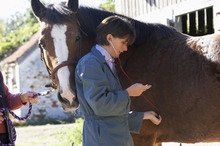On January 6, 2015, the National Veterinary Services Laboratories in Ames, Iowa confirmed a finding of vesicular stomatitis virus (VSV) infection (New Jersey serotype) on equine premises in Santa Cruz County, Arizona.

Veterinarian checking horse for symptoms of disease
According to the Arizona Department of Agriculture, three properties in Santa Cruz County are now under quarantine after horses were diagnosed with the contagious livestock disease Vesicular Stomatitis Virus.
Two horses on the premises met the case definition of VSV infection with compatible clinical signs and positive complement fixation antibody titers.
Three properties in Santa Cruz County are now under quarantine after horses were diagnosed with the contagious livestock virus, government officials said Thursday.
Vesicular Stomatitis Virus mainly affects horses and to a lesser extent cattle and swine, said Arizona Department of Agriculture State Veterinarian Dr. Perry Durham. Though very rare, people can also be infected.
Transmission of the disease is not completely understood, but includes insects, mechanical transmission of fluids and livestock movement.
Two horses were confirmed to have the virus, one having been moved to its owner's nearby property before the investigation began. Currently all three properties and all the animals on them are under quarantine.
The horses have no history of travel and other livestock on the properties show no signs of infection. The case has already been investigated by both the U.S. Department of Agriculture and the state.
The investigation is ongoing to monitor and prevent further spread of the virus, according to a news release from the Arizona Department of Agriculture.
Vesicular Stomatitis causes blister-type sores on the mouths, tongue and noses of infected animals. They can be painful and impede the animal's ability to eat and drink. There are no USDA approved vaccines for the virus.
Basic sanitation and biosecurity measures provide the best prevention against VS spread. Infected horses should be quarantined and handled and fed last â after all of the healthy animals on the farm have been cared for.
People handling infected horses should shower, change clothing, and disinfect all equipment after use. Latex gloves should be worn by those handling infected horses to reduce the risk of transmission between horses and from the horse to the handler.
Basic farm biosecurity should involve:
- Fly and insect control
- Individual feeders and equipment
- Regular cleaning of feeders, waterers, trailers, and other equipment
- Isolation of new horses for 21 days
- Providing good nutrition and a regular exercise, vaccination, and deworming schedule since healthy horses are likely to have stronger immune systems.
